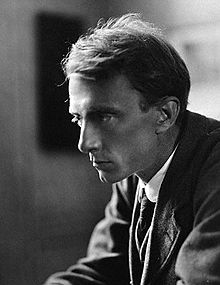Edward Thomas (writer)
Philip Edward Thomas (born March 3, 1878 in London , † April 9, 1917 at Arras ) was a British poet, literary critic and essayist .
Life
Literary work
Edward Thomas studied history at Lincoln College , Oxford . He earned his living primarily as a journalist with book reviews, of which he wrote up to fifteen a week. Poetry reviews, especially new authors, were one of his main focuses and the first publications by Rupert Brooke , WH Davies , Walter de la Mare , DH Lawrence or Ezra Pound were well-meaning, and he was personally acquainted with Brooke and Davies. Thomas did not allow himself to be guided by friendly or commercial points of view in his reviews, but instead took his own independent point of view. He was also friends with the influential art lover Edward Marsh and belonged with him to the award committee of the Poetry Review , which gave Brooke a prize against Thomas' voice for his poem The Old Vicarage Grantchester .
Rupert Brooke's posthumously published collection '1914 & Other Poems' was reviewed in two separate articles for the English Review (June 8, 1915) and Daily Chronicle (June 18, 1915). Thomas placed the late Brooke on the one hand, in keeping with the prevailing mood of the time, among the great English poets such as Percy Bysshe Shelley , George Gordon Byron or John Keats , on the other hand, however, his articles also raised concerns about death caused by death so suddenly acclaimed fame of the poet.
Thomas himself did not begin to write poetry until late 1914, encouraged by Robert Frost . These were published under the pseudonym "Edward Eastaway". At this time he also had personal contact with the Dymock Poets and is therefore seen as part of the group. Thomas also wrote a novel: The Happy-Go-Lucky Morgans (1913).
Military service and death
In July 1915, Thomas volunteered for military service and was assigned to the Royal Garrison Artillery . A few days after his arrival in France , he was killed near Arras by the shock wave from the recoil of his own cannon. The burial took place in France in the military cemetery of Agny .
Editions of the poems (selection)
- Collected poems . With a foreword by Walter de la Mare . Selwyn & Blount, London 1920.
- The Poems of Edward Thomas . Edited by R. George Thomas. Oxford University Press, Oxford 1978.
- The Collected Poems and War Diary, 1917 . Edited by R. George Thomas. Faber and Faber, London 2004.
- The Annotated Collected Poems . Edited by Edna Longley. Bloodaxe Books, Tarset 2008.
Secondary literature
- Harry Ricketts: Strange Meetings - The Poets of the Great War , Chatto & Windus, London 2010, ISBN 978-0-701-17271-8 .
- Matthew Hollis : Now All Roads Lead to France: The Last Years of Edward Thomas . Faber & Faber, London 2011, ISBN 978-0-571-24598-7 .
- Jean Moorcroft Wilson: Edward Thomas: From Adlestrop to Arras . Bloomsbury, London 2015, ISBN 978-1-4081-8713-5 .
Web links
- Works by Edward Thomas in the Gutenberg-DE project
- Literature by and about Edward Thomas in the catalog of the German National Library
Individual evidence
- ^ Harry Rickets, Strange Meetings , p. 22.
| personal data | |
|---|---|
| SURNAME | Thomas, Edward |
| ALTERNATIVE NAMES | Thomas, Philip Edward (full name); Eastaway, Edward (pseudonym) |
| BRIEF DESCRIPTION | British poet, literary critic and essayist |
| DATE OF BIRTH | March 3, 1878 |
| PLACE OF BIRTH | London |
| DATE OF DEATH | April 9, 1917 |
| Place of death | Arras |
